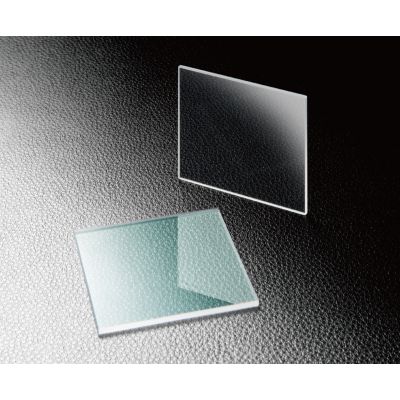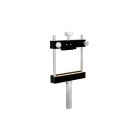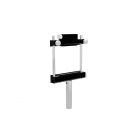Variable Plate Beamsplitter Synthetic Fused Silica 50x50mm 266nm
VBS-50S03-1-266
With a variable beamsplitter, the incident angle of a laser can be changed. The (R:T) ratios can also be modified. This is commonly used to adjust the light intensity of the laser without a variable adjustment of the light intensity or the laser to be stabilized.
◦The variable beamsplitter has a dielectric multilayer coating which has excellent durability and light resistance.
◦The beam shift caused by the tilt of the beamsplitter can be removed by using a correcting plate. (See how to use)
◦It can be used for arbitrary polarization. However, the transmittance characteristic depends on the polarization.
◦The beam shift caused by the tilt of the beamsplitter can be removed by using a correcting plate. (See how to use)
◦It can be used for arbitrary polarization. However, the transmittance characteristic depends on the polarization.
| Name | Variable Plate Beamsplitter Synthetic Fused Silica 50x50mm 266nm |
|---|---|
| Weight | 0.0170kgs |
| Standard Coatings Available | No |
| Guide |
|
| Remark | - |
| Attention |
|
| Design wavelength | 266nm |
| Image Label | Variable Plate Beamsplitter Synthetic Fused Silica 50x50mm 266nm |
| Laser Damage Threshold | 1J/cm<sup>2</sup> |
| Material | Synthetic fused silica |
| Material | Synthetic fused silica |
| Surface flatness | λ |
| Parallelism | <5″ |
| Coating |
Front surface ; Dielectric multilayer coating Rear surfaces ; Multilayer antireflection coating |
| Surface Quality (Scratch-Dig) | 10−5 |
| Clear aperture | Circle that inscribed in a square of 90% of the dimensions |
| Effective beam incident diameter | Ellipsoidal 30×43mm (Angle of inclinaison) |
| Dimensions | 50 × 50mm |
| Wavelength range | 266nm |
| S-Polarization Transmittance (θ=0°) | >90% |
| S-Polarization Transmittance (θ=45°) | <5% |
| Laser Damage Threshold <sup>*</sup> | 1J/cm2 |
| Availability | Please contact |
In stock
SKU
VBS-50S03-1-266
€423.20
With a variable beamsplitter, the incident angle of a laser can be changed. The (R:T) ratios can also be modified. This is commonly used to adjust the light intensity of the laser without a variable adjustment of the light intensity or the laser to be stabilized.






